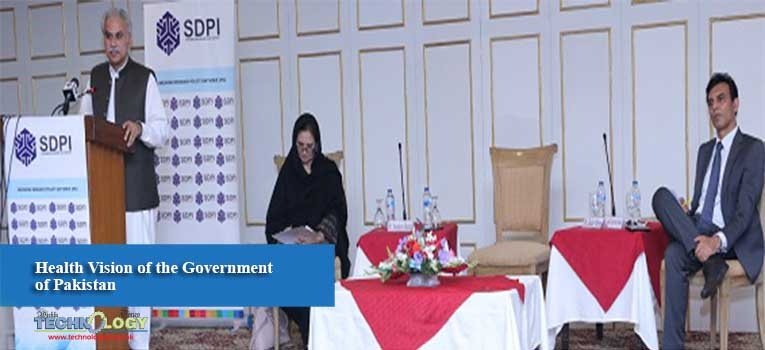Minister of State for Health, Dr. Zafar Mirza said without an effective and quality primary healthcare no country can achieve improvements on health indicators including child mortality rate, life expectancy rate etc. He said the government vision is to ensure universal healthcare coverage (UHC) for every individual which includes the full spectrum of essential, quality health services, from health promotion to prevention, treatment, rehabilitation, and palliative care.

While delivering the keynote address on ‘Health Vision of Government of Pakistan’organized by the Sustainable Development Policy Institute (SDPI), Dr Zafar presented the framework for UHC in Pakistan that how different healthcare facilities can be provided at community, primary, secondary and tertiary levels. He said primary healthcare is the backbone and foundation for improved healthcare system in a country which is being ignored since long in Pakistan.
Dr. Zafar Mirza, said in Pakistan, healthcare system has become disease oriented rather health oriented, where health is much larger subject which include physical and mental healths, social healths and wellbeing. He said right to health was not guaranteed in our constitution. Since 1947, owing to lopsided and inconsistent policies, Pakistan has become a hospital oriented country where primary healthcare was ignored and never considered as basic huma right, he added. 70 to 80 per cent budget of healths go to big hospital, whereas Basic Health Unites (BHUs) was not provided with much needed basic facilities.
In the context of 18th amendment, he said the major macro level programmes of health sectors, such as Hepatitis, Malaria and HIV control programmes, were either weaken or closed largely due to lack of proper coordination among provinces and center. Due to our irresponsible behavior towards these disease control programmes of national importance, which can be easily controlled, the prevalence of Hepatitis disease reached to dangerous 79 per cent in the country, he lamented.
He said devolution of power does not mean that the federal government was absolved from its national responsibilities. He said the federal government can have regulatory framework at the national level within the umbrella of 18th constitutional amendment. He stressed the need for a well thought-out, integrative and effective national regulatory framework for health services. Moreover, at federal level, we need to reform our institutions within healths sector, where there are around 37 different departments and divisions, which require fundamentals reforms.
He said population time boom is our top national issue, which requires immediate interventions. The contraceptive prevalence rate in Pakistan is 24 per cent, where around 4 million unwanted pregnancies can be controlled through provision of contraceptive measures. He said with the current rate of population growth, by 2030, Pakistan will become 5th biggest population country of the world. One of positive development under institutional reforms agenda of the current government was the merger of population department with health ministry, he added. On health financing, Dr Zafar said Pakistan’s per capita spending on health was lowest and even below the minimum threshold standard to achieve the basic level of the universal health coverage. We need to change the discourse towards the health sector. At macro-economic framework level the directions need to be changed, where we need to invest into human capital which will lead to economic growth. For that we must ensure high quality healths services, without which universal healthcare coverage (UHC) cannot be achieved. Health services shouldn’t be denied due to financing issues, which is critical integrated component of the healthcare system for UHC.
On question of tobacco control measures, he responded that the government abolished the third tier taxation structure and increased the duties, not only on tobacco products but on all hazardous products. He said we are moving towards plan packaging and will make the tobacco Industry accountable. Measure will be taken to ensure that the health cost on diseases due to the tobacco products, should be paid by the same industry, he stressed.
Dr Nousheen Hamid, Parliamentary Secretary, Ministry of National Health Services Regulations and Coordination said Pakistan is an over legislative country where implementation remained one of the major challenges. She said there are 196 laws related to health sector and some of the laws are too old which require fundamental revision to the modern needs. Due to 18th amendment, there is no uniformity in the laws, as provinces and the center are working in different directions, she said adding the need for uniformity in legislations through enhanced coordination among center and provinces, within the umbrella of 18th amendment.
Dr Abid Qaiyum Suleri, Executive Director, SDPI said during the 2018 election campaign, the prime minister Imran Khan expressed his attention for health justice, where a such system of health justice should be in place where income level could not be a hurdle in access to health facilities. He said this resolve of the prime minister was expressed in the letter of intent of his government to the IMF, where social protection was the third major pillar of the programme, where previous IMF packages were focused only on fiscal consolidation and structural reforms.